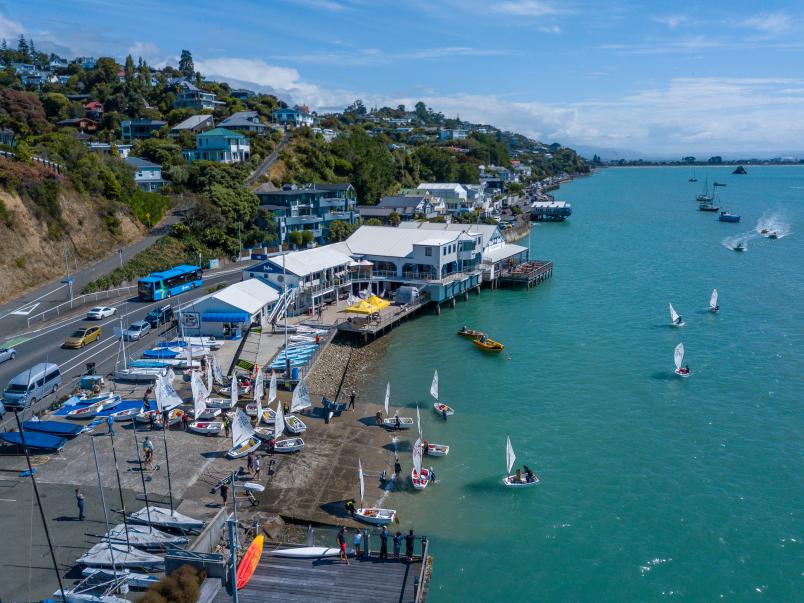Yachting New Zealand’s groundbreaking RŪNĀ schools framework has played a big role in helping one of the country’s sailing clubs evolve into a true asset for its local community.
And says Nelson Yacht Club manager Tim Fraser-Harris, building relationships with schools and raising awareness of the programme have been vital steps on this journey.
Last season, more than 700 students from seven local schools participated in both onshore and sailing activities at the club, through RŪNĀ’s Kōkōkaha and Kōrinorino modules.
“We’ve been fortunate to establish strong relationships with several local schools over the years, with more than 200 additional students taking part in sailing experiences beyond the RŪNĀ programme,” Fraser-Harris said.
Securing support from Port Nelson Limited has enabled the club to offer free Kōkōkaha sailing experiences to tamariki from six local low-decile schools, reaching approximately 500 students.
While finding the right contacts within schools often comes down to “who you know,” last year’s Yachting New Zealand RŪNĀ hui and Moanamana teacher development day, hosted by the club, helped raise awareness among educators.
The club’s engagement has expanded with the Kōrinorino module, which includes shore-based activities, making sailing more accessible to a wider range of students. These activities were developed collaboratively with local teachers and Yachting New Zealand’s education lead, Alisa Torgersen.
“It’s inspiring to see teachers actively involved in shaping this programme,” Fraser-Harris said.
“We’re excited for what’s next and have some exciting ideas in the pipeline.”

Nelson Yacht Club had hundreds of kids experience the programme last season. Photos / Supplied
A central aim of RŪNĀ is to increase diversity in sailing. Fraser-Harris feels sailing resonates strongly with New Zealanders, as “so many can trace their family history back to those who navigated the ocean under sail”.
“It’s early days, but RŪNĀ is beginning to make a difference.”
As the club’s outreach grows, the challenge of finding and retaining qualified coaches persists. “We rely on both experienced international coaches and our ‘Leaders in Training’ programme, where young sailors, around 14 or 15, volunteer to support seasoned instructors,” Fraser-Harris explained.
This programme also offers formal training, including powerboat handling, marine VHF operation, first aid, and Yachting New Zealand’s Learn to Sail Coach course.
The club’s funding relies significantly on local sponsorship and user fees.
“Port Nelson Limited’s support is crucial in helping to make sailing more accessible, whilst wider programmes operate on a user-pays basis,” Fraser-Harris said.
The club has also developed a valuable partnership with the local Mitre 10 franchise, which sponsors sails, aided by the owner’s history with the club.
With Moanamana (the third and final RŪNĀ module) and Yachting New Zealand’s Clean Club programme included in its Strategic Plan, the club aims to become a hub for connecting tamariki and rangatahi to the marine environment.
Fraser-Harris believes Nelson Yacht Club’s alignment with RŪNĀ is key to its long-term success.
“RŪNĀ will look very different for different clubs. While our Sailing School structure supports a large programme, I’d encourage other clubs to consider RŪNĀ’s benefits for both club and community.”
“While there’s still work to be done, the club is evolving beyond a typical sailing club — it’s becoming a true community asset.”
A teacher's view - Sarah Johns (Nelson Intermediate)
When and how did you first hear about RŪNĀ?
In mid-2023 when Yachting New Zealand and Tim from the Nelson Yacht Club, visited Nelson Intermediate. They shared an inspiring vision to partner with schools and create a flexible programme where students could get on the water, explore STEAM (science, technology, engineering, arts and mathematics), connect with local stories, and, as Sir Peter Blake envisioned, fall in love with the marine ecosystem enough to want to protect it.
Would you recommend other teachers and clubs get involved?
What we enjoy most about being connected to the sailing club is that we’ve offered a learn-to-sail programme for several years, and it’s always been a positive experience for our learners. It gives them a chance to try something new and broaden their experiences. With the addition of the RŪNĀ modules, there’s now a deeper, real-world connection that extends into multiple areas of the curriculum, making learning more engaging.
How did the RŪNĀ lessons support your teaching goals?
It has aligned perfectly with our teaching goals by providing clear links to the curriculum and opportunities to create differentiated experiences for learners. The classroom activities encourage discovery-based learning and are offered at various levels, making it easy to revisit the programme in consecutive years. In Term 1, our school’s focus was on exploring our cultural narrative, place, and whanaungatanga, and engaging with RŪNĀ lessons alongside a day at the local yacht club really brought those themes to life for the students.
What specific elements of the RŪNĀ programme are most effective in promoting student learning?
The flexibility of the RŪNĀ programme is one of its greatest strengths. You can tailor it to your learners’ needs and your school’s context, using the resources to plan lessons leading up to the sailing experience, choose land-based activities at the club, and design follow-up tasks back at school. This adaptability is especially useful for working around tides and the nature of your group. In 2024, our students loved the activities that helped them explore sailing and connect with Kāpehu Whetū, the star compass used by early navigators. We’re also excited to engage with Monanamana in 2025.
If your club is not yet a RŪNĀ club but would like to be, please contact Torgersen at alisa@yachtingnz.org.nz for your next steps.




